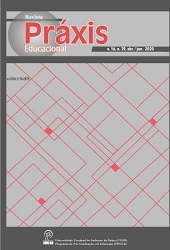RISK MANAGEMENT AND FINANCING OF HIGHER EDUCATION INNOVATIVE DEVELOPMENT UNDER THE CIVILIZATIONAL CHANGES
DOI:
https://doi.org/10.22481/praxisedu.v16i39.6379Keywords:
Innovative, Society, Risks management, Financing educationAbstract
The research of the information and high-tech progress development in the sociohumanitarian aspect allowed us to reveal its consequences in the context of natural and civilizational challenges and areas of financing education. The risks management and general trends were clarified of innovative education development at the institutions in the era of information-high-tech progress and natural-civilizational changes, which have created fundamentally new opportunities for justifying educational strategies and should be based on the categories of pedagogy of the noosphere-space direction. Therefore, it is necessary to build new pedagogical theories on the synthesis of philosophicaleducational, philosophical-anthropological, polyparadigmal, civilizational-formational and cultural approaches. According to this principle, lifelong learning becomes important in order to meet the challenges of modern progress and counteract destructive natural and civilizational changes.
Downloads
Metrics
References
Andrushchenko, V. (2015). Higher education post-Bologna space: attempt прогностического the analysis. Philosophy of formation, 2, 6–19.
Bodnar, S., Mirkovich, I., Koval, V. (2019). Human capital development in Ukrainian education system by means of language integrated teaching. Dilemas contemporaneos-educacion politica y valores, 7 (SI), 14.
Borychenko, K., Hudz, A., Koval, V., Golubkova, I., Mazur, A. (2019). European standards for social protection of internally displaced persons. Dilemas contemporaneos-educacion politica y valores, 7 (SI), 88.
Bukanov H., Kolesnyk A., Tashkinova O., Kotlubai V., Koval V. (2019). Social marketing in public administration of social service institutions. Revista Genero & Direito, 8 (6), 457-468.
Fukuyama, F. (2002). Our Posthuman Future: Consequences of the Biotechnology Revolution. New York: Pikador (Farrar, Straus and Giroux).
Kaku, M. (2011). Physics of the Future: How Science Will Shape Human Destiny and Our Daily Lives By the Year 2100. New York: Doubleday.
Koval, V., Petrashevska, A., Popova, O., Mikhno, I., & Gaska, K. (2019). Methodology of ecodiagnostics on the example of rural areas. Architecture Civil Engineering Environment, 12(1), 139-144. doі: 10.21307/ACEE-2019-013
Koval, V., Polyezhayev, Y., & Bezkhlibna, A. (2018). Communicative competences in enhancing of regional competitiveness in the labour market. Baltic Journal of Economic Studies, 4(5), 105-113. doi:10.30525/2256-0742/2018-4-5-105-113
Koval, V., Pukała, R. (2017). Implementation of regulatory policy in economic activity: development of the institute regulatory impact assessment. Economics. Ecology. Socium, 1(1), 24-32.
Kvitka, S., Starushenko, G., Koval, V., Deforzh, H., & Prokopenko, O. (2019). Marketing of Ukrainian higher educational institutions representation based on modeling of Webometrics Ranking. Marketing and Management of Innovations, 3, 60-72. http://doi.org/10.21272/mmi.2019.3-05
Lantsev, I. (2015). Strategies, Goals the and Objectives of advanced education in the light of the eschatological expectations and futuristic progections. Future Human Image, 2(5), 149–163.
Lem, S. (2013). Summa technologiae. Minneapolis: University of Minnesota Press.
Luchaninova, O., Koval, V., Deforzh, H., Nakonechna, L. & Golovnia, O. (2019). Formation of communicative competence of future specialists by means of group work. Espacios, 40 (41), 11.
Medynska, А. (2018). The factors affecting to the quality of life the Ukrainian people. Innovative economics and management, 3, 126–132.
Mushynska, N. (2018). Means of future economists’ professional self-development in the educational process of foreign language studying. Economics, Ecology, Socium, 2(3), 45–56.
NMC Horizon Report (2016). Higher Education Edition, 2016. http://www.edu-trends.info/education-news-january-2016/
Polischuk, N.V. (2018). Features of transformation of education and spirituality in an era of globalization and cosmization. Scientific and theoretical almanac «Grani», no 21(8), 103–111. doi: 10.15421/1718107 [in Ukrainian].
Polishhuk, N.V. (2018). Educational strategies in the vector of civilizational progress. Social and economic aspects of sustainable development of regions, Opole: The Academy of Management and Administration in Opole, 222–232.
Sagan, C (1973). Communication with Extraterrestrial Intelligence (CETI). Cambridge, MA: MIT Press.
Schewe, M. (2003). Teaching intelligently by feeding multiple learner intelligences – through drama. Inozemni movy [Foreign languages], 4, 53-55.
Shamilishvili, G. (2019). Psychological influence of modern mass media on formation of gender stereotypes. Economics. Ecology. Socium, 3(2), 71-76. https://doi.org/10.31520/2616-7107/2019.3.2-8
Shejko, V.M. (2001). Culture. A civilization. Globalization (end ХІХ – beginning ХХІ of century). (Vol. 1). Kharkiv: Osnova [in Ukrainian].
The law of Ukraine On Formation (2017). Data of the Supreme Rada, no 38-39, st.380. http://zakon.rada.gov.ua/laws/show/2145-19> [in Ukrainian].
Voznyuk, О.V. (2014). Theoretical-methodological bases of development of the person of the teacher in conditions a civilization of changes. Аbstract of the D.Sc. Disserttation. Ivan Franko Zhitomir State University [in Ukrainian].
Zlotnikova, L. (2016). Humaniterian problems in the context of upgrade. Innovative economics and management, 2, 26–30.
Каrpenko, М.М. (2017). Prospects of introduction of innovative forms of formation in Ukraine. National institute of strategic researches. An analytical note.
Downloads
Published
How to Cite
Issue
Section
License
You are free to:
Share - copy and redistribute the material in any medium or format; Adapt - remix, transform, and build from the material for any purpose, even commercially. This license is acceptable for Free Cultural Works. The licensor cannot revoke these freedoms as long as you follow the terms of the license.
Under the following terms:
Attribution - You must appropriately give credit, provide a link to the license, and indicate if any changes have been made. You may do so in any reasonable way, but not in a way that suggests that you or your use is endorsed by the licensor.
There are no additional restrictions - You cannot apply legal terms or technological measures that legally restrict others to make any use permitted by the license.










